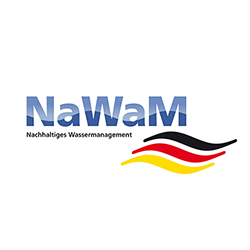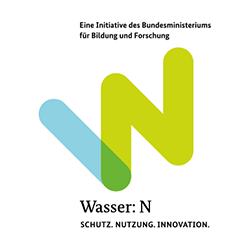Selective removal of monovalent ions from saline waters for groundwater recharge and drinking water treatment
Background:
Due to the globally increasing demand for water and the decreasing available freshwater resources, there is a worldwide interest in efficient desalination processes. Freshwater influenced by the sea or geogenic salt deposits contains, among other things, elevated concentrations of monovalent ions, such as sodium and chloride, as well as polyvalent ions, such as magnesium and calcium. High nitrate and sulfate concentrations, on the other hand, usually result from agricultural influence. A complete desalination is not useful, but only a reduction of the monovalent ions is necessary. For this purpose, selective membranes for a specific retention of monovalent salts are developed and installed in newly designed modules for use in an electrochemical process in laboratory and pilot plants. The plants will be used for investigations to identify optimized process and plant parameters depending on different raw water qualities and treatment targets. Resulting effects and challenges for groundwater recharge and drinking water treatment will be investigated. The developed technology will be compared with international target parameters such as the sustainability goals by means of a holistic economic-ecological sustainability assessment in order to derive recommendations for action. By choosing partners from industry, science and practice, the consortium is able to build plants and to test and evaluate the innovative technology on site with practical partners. The results thus make a significant contribution to safeguarding water resources, both nationally and internationally.
Aims:
The aim of innovatION is therefore the development of a mMCDI (monovalent membrane capacitive deionization) for the targeted removal of monovalent ions from saline groundwater and surface water. The aim is to develop an energy-efficient technology for the retention of monovalent ions by combining the separation effects of nanofiltration, ion exchange and membrane capacitive deionization using polar and bipolar electrodes. The areas of application being investigated are treatment to produce drinking water and stabilization of the landscape water balance by infiltration with monovalent-partially desalinated water. Areas of application are saline or salinated aquifers on the coast or on islands as well as groundwaters heavily polluted with nitrates. With the help of practical laboratory and pilot tests, the process and plant parameters are to be identified for the mMCDI depending on the different raw water qualities and treatment targets. For the transfer into practice, the resulting effects and challenges for groundwater recharge and drinking water treatment will be examined. In addition, the developed technology will be compared with international target parameters such as the sustainability goals on the basis of a holistic economic-ecological sustainability assessment in order to derive recommendations for action for the design and operation of the desalination plant.



